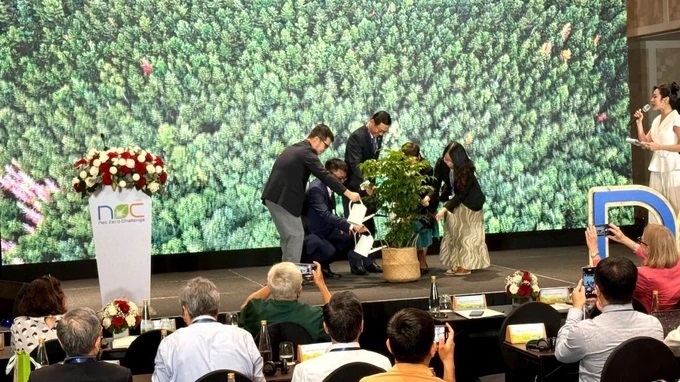HCMC's Net Zero Challenge 2024 and the new waste-to-energy plant demonstrate the city's commitment to environmental sustainability and economic growth.

The 2nd launch of “Challenge” in 2024 started with the action of watering plants
The event “Net Zero Challenge 2024”, co-held by the HCMC Institute for Development Studies in collaboration with its partners, kicked off on July 16 on a larger scale than its inaugural edition in 2023. The challenge aims to identify climate change technology solutions for pilot implementation in Vietnam, with a particular focus on quality and attracting investment capital for the city's green projects and startups.
The projects and ideas presented in the first edition, across the three technology competition categories - green ideas, green solutions, and green growth - demonstrated a genuine shift towards sustainable practices, aligning closely with real-life needs.
The three winning solutions in 2023, namely “Low-cost thermal energy storage system using sand batteries” by Alterno - Vietnam, “Rapid on-site testing to detect diseases in shrimp” by Forte Biotech - Singapore/Vietnam, and “Plastic replacement materials made from biological waste at competitive costs” by AirX Carbon - Vietnam, have proved the accelerating pace of greening in global technology - energy economics.
Meanwhile, facing the growing daily household waste generation of 9,800 tons in a metropolis of 13 million residents, HCMC has set an ambitious target in its 10th Party Congress Resolution (2020-2025) of having 80 percent of household waste treated via advanced technologies (waste-to-energy incineration) by 2025, aiming for 100 percent in 2030.
The establishment of a waste-to-energy plant in the city marks a significant step in the city's efforts to address waste management challenges and achieve these goals.
Following the approval of the National Power Development Planning for the 2021-2030 period, with a vision to 2050 (Power Plan 8) and prior to the Central Government's approval of the HCMC Planning, the HCMC People's Committee has expedited the transition to waste treatment technologies within the city. It has actively addressed obstacles and created favorable conditions for qualified businesses to obtain licenses to construct waste-to-energy incineration plants.
With a sense of social responsibility, the municipal authorities have been determined to address waste-related issues, greatly instilling confidence in potential investors. Particularly, on July 5, 2024, the HCMC Construction Department formally granted a construction license to Tam Sinh Nghia Investment Development JSC. to build a waste-to-energy incineration plant with a capacity of 2,000 tonnes per day (stage 1) and 6,000 tonnes a day (stage 2).
Considering that Vietnam, and HCMC in particular, has yet to effectively implement waste sorting at source, the investor has opted for a multi-stage incineration technology capable of effectively burning unsorted and unprocessed waste. This technology serves a dual purpose of addressing the waste issue and promoting renewable energy.
These two "green credentials" in July are complemented by HCMC's launch of the "For a Green Can Gio" action program, establishing a green development model for the city.
A series of concrete initiatives, such as rooftop solar power solutions, forest management and protection linked to carbon credits, a communication program to raise awareness and enhance the image of Green Can Gio, green transportation projects, sustainable ecotourism, green villages, and the replanning of residential areas and marine commercial and service establishments towards a blue ocean approach, are being implemented.
“The city is committed to accompanying these concrete activities to realize the goal of a Green Can Gio”, said Chairman Phan Van Mai of the HCMC People’s Committee, adding that these efforts are contributing to both developing this district and preserving the ecological values of its mangrove forest.
With its concrete actions and numerous "green credentials", HCMC is steadily advancing towards its goal of green and sustainable development.
By Nguyen Quan Cat - Translated by Thanh Tam